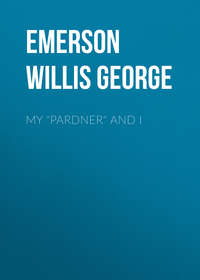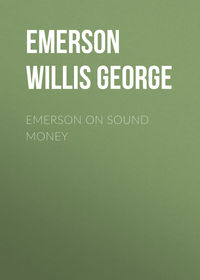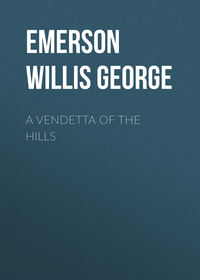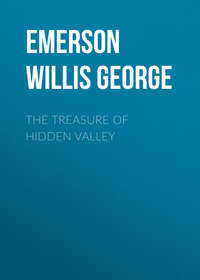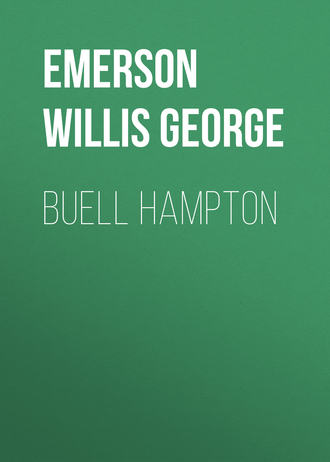 полная версия
полная версияBuell Hampton
“Lynn, will you keep silent!” said the major, sternly.
“Jest remin’s me,” said the judge, getting on his feet in a rather uncertain manner, “I’ve got to pay a bill to Buck Truax that’s over a day past due. ‘Scuse me, gentlemen, fur ‘bout five minits. Will I be back? Well, I should say I would. Course I will. You can’t lose me. Bet yer life you can’t.”
“As district organizer of the Farmers’ Alliance,” continued the major, “I am brought into contact with the bone and sinew of the country. I frequently meet progressive spirits – the advance-guards, as it were, of a higher development – who will lose nothing when the progress of civilization overtakes them. To meet the requirements of the hour, and with the hope of bettering the condition of mankind, I conceived the idea of organizing a secret society, where these advance-guards might meet and deliberate upon all live, progressive topics of the day, and especially upon the problems most vitally affecting the welfare of humanity – an organization free from political influences. One of its objects is the diffusion of knowledge, which surely will be followed by a general advancement of the human race. Now, I wish to ask you, Mr. Stanton, if its conception and its objects are not most worthy?”
“Without question,” replied Hugh, “to diffuse knowledge and to better the conditions of the human race are most important motives, underlying the superstructure of all good government.”
“It is not the government as set forth by the laws of a nation, so much as it is, my dear Stanton, obedience to the unwritten laws emanating from the first Great Cause. The hope of humanity is happiness, and happiness consists of a great love, and much service and sacrifice to the children of men and to the Omnipotent Ruler of the universe, who will hold us responsible if we are derelict in our duties to those who are helpless and incapable of self-protection. This work approaches holiness, which might be defined as an infinite compassion for others.”
“Bet yer life,” said Judge Lynn, as he staggered into the room. “When the major speaks, it’s nachral we want to lis’n, that’s what I say – golden thoughts are droppin’ ‘round here from lips of wisdom – reckon I know.”
“Judge Lynn, will you please be quiet?” said the major..
“Course I will; gimme a cigar. Maybe I don’t know brains when I hear ‘em workin’.”
“Our organization,” continued the major, “embodying these great principles, is known as the Barley Hullers. Its principles and the intricacy of its beneficent workings partake somewhat of the accumulated wisdom of the centuries. In the secret haunts of earth, far removed from the busy marts of commerce, lives are being dedicated to the work of solving the mighty problems of humanity. The leaching out of selfishness, through the sieve of much suffering and self-denial, is having its effect. The world is to become better through the practical advocates of these mighty principles. Mr. Stanton, you are needed in the vineyard. We want our deliberations enriched by your words of wisdom. You certainly owe some of your time to this great work of human advancement.”
“I do not see,” replied Hugh, hesitatingly, “how I could benefit your organization. Besides, I am a banker, and most of the members of the Barley Hullers, I take it, are directly engaged in agricultural pursuits.”
Judge Lynn here interrupted, shutting one eye in a knowing way. “Great Scott! man, that’s where you, as a member of the Barley Hullers, would have a special lead-pipe cinch on these other bankers. Yes, sirree! Jine the Barley Hullers, and you’ll scuttle your contemporaries in the seethin’ sea of desperation. Gee, that’s easy.”
“Yes, there would doubtless be a personal gain,” said Hugh. “In a business way I can readily see the advantages, but, if there were no other reasons, that in itself is sufficient to decide me against permitting my name to be offered as a candidate for membership.”
“Judge Lynn,” said the major, sternly, “will you confine yourself to your cigar and let me discuss this subject with Mr. Stanton!”
“Well, why not?” said the judge, as he blinked and looked with an intoxicated blankness at the major. “Bet yer life; course I will; I’m not hankerin’ after any man’s job. Not a Barley Huller no way. But I can tell, on short acquaintance, a good article of barley juice when I taste it, bet yer life I kin.”
Major Hampton’s face wore a look of irritation, but, as he turned from the judge to Hugh, the latter noticed that an expression of kindly sympathy had gained the mastery.
“The unwritten manual of the Barley Hullers,” said the major, “aims at the betterment of the human race, and advancement must surely mark its onward course. The organization is destined to be a power for good. Its influence will be felt, both in the state and in the nation.”
“Bet yer life,” interposed Judge Lynn, in maudlin tones. “There’s Mrs. Fleece, the blue-stockin’ catamount of the Sunflower State; she’s in this ‘ere great work heart an’ soul, while her henpecked husband runs a drug store. Hully gee! how I wish I owned a drug store. By the way, that reminds me,” and here the judge staggered to his feet again, and said he had to see a man “‘round the corner.” He, however, soon returned. His intoxication was becoming more noticeable, and his interruptions increased with each trip “‘round the corner.”
The major contained himself with fortitude, and went on addressing Hugh with great energy. “New lodges are daily being organized in different parts of our State; indeed, the influence of the Barley Hullers is beginning to be felt even beyond the borders of the Sunflower Commonwealth. Assistance, my dear Stanton, of which you know not, will help to scatter the seeds, looking toward the equality of the people in every neighborhood throughout this nation; and I prophesy that in the very near future the members of this society will rise in Herculean might, and sweep the Augean stables of plutocracy and of plutocrats, and will never stop until they organize a lodge of Barley Hullers in the Green Room of the White House. The rich must contribute to the needs of the poor, and an equalization of wealth must conform to the equality of men, as foreordained by the Supreme Ruler.”
“How can you accomplish all this,” asked Hugh, “if the Barley Hullers is a non-political organization?”
“A general uprising of the people,” said Major Hampton, “an uprising of advanced thinkers and their proselyted followers who, with one accord, will rise like the high-capped waves on the limitless deep, and, in a phalanx that cannot be stayed, will march against the strongholds of capital, financial conspiracies, and legalized robbery. Of course many things may conspire to blind the people. Gifts by millionaires to so-called ‘charitable institutions,’ such as churches, hospitals, and asylums, have a tendency to lull the people into inaction. These pretended philanthropies, given to be seen of the world, are but hollow mockeries, and will prove, instead of robes of spotless white for the donors, only worthless rags of shame and disgrace.”
“Your earnestness and sincerity, Major,” said Hugh, “I cannot doubt or question, but I do believe that it is not proper for me to join the Barley Hullers.”
The major looked grieved. “Well, Stanton, think it over,” said he, “think it over, and after awhile you may decide differently.”
“Give it to my way farin’ frien’, Major, them’s my sentiments to a dot; bet yer life they are.”
“Judge Lynn,” said the major, “keep quiet; you’re drunk.”
“A’ right, Major,” replied the judge, hazily. “Heerd some’un shay speech wazn only silver-plated anyhow, an’ silence wazh golden. I know two or three legerdemain tricks, bet yer life I do. Gimme ‘nother drink.”
“Major Hampton,” said Hugh, when the judge had subsided, “your words have made a great impression upon me. Do you know that sometimes I am filled with a vague sense of mystery when listening to your impassioned words in behalf of the multitude? Your charities have also caused me to marvel. It matters not in what part of the country I travel, I find where your secret charities have blessed the poor and needy, and then – ”
“That’s all right, Stanton, it is not I to whom thanks are due. There is a higher power that is responsible for every benevolent act of my life. I am but an instrument – a missionary – doing the work that has been assigned to me, and I am far from being satisfied with the results of my labor. It is growing late, and perhaps we had better go.”
In the meantime Judge Lynn had ceased his interruptions. He had fallen into a drunken stupor.
“Assist me, Stanton,” said the major, sorrowfully, “and we will let him rest here for the night.”
Soon Hugh and the major were walking thoughtfully homeward along the deserted streets beneath a myriad of twinkling stars, while Judge Lynn was snoring lustily in drunken stupor on a large, leather-covered lounge, muttering incoherently the while, “Bet yer life! Bet yer life!”
CHAPTER XX. – A DINNER AT THE HORTONS
BARLEY HULLERS,” mused Hugh, when he awoke the next morning, “composed of chosen spirits, with boutonnihres of barley heads as an insignia of rank. I doubt not that if I were engaged in agricultural pursuits I should join them. But why, I wonder, did Major Hampton solicit me to identify myself with the order? The more I see of the old major the more I admire him, notwithstanding the half mystery that seems a part of him, and the contradictory elements in nis nature. Let me see – I have decided to ask Ethel Horton to be my wife.”
As he made his toilet he saw a reflection of his face in the mirror, and blushed as if he had been caught in the very act of preparing a declaration of love to Ethel. “Yes, it is a privilege and a duty. I can do no more than try; and then conscience urges me on.”
Arriving at the bank, he found a letter from Mrs. J. Bruce-Horton inviting him to the Grove for dinner that evening.
“I also received one,” said Captain Osborn, approaching Hugh’s desk. “I presume that the Hortons are giving a spread in honor of Lord Avondale.”
“Do you think it has any significance?” asked Hugh.
“Well, I am a little worried about it,” replied the captain. “They may announce Ethel’s engagement for all one knows, but, sir, I don’t believe it! No, sir, she is too sensible a girl and has too much American blood in her to be caught by an English title.”
“I hope you are right,” observed Hugh, sighing secretly, as he went on with his work.
That evening, on arriving at the Grove a little late, Hugh found not only the Osborns and Lord Avondale, but also Major Hampton and his daughter Marie.
Ethel Horton was all animation in helping her mother entertain, but Hugh’s quick eye detected a shade of sadness in her face. The light-hearted girl whom he had known in the first months of his residence in Kansas had to him now more the appearance of a conventional young woman of the world. Formalities had banished much of the girlish frankness of earlier days, leaving, indeed, only a trace.
Marie Hampton was attired in a beautiful evening gown of white silk, with a knot of La France roses at her corsage. Her beauty struck Hugh as never before. It aroused in him a sincere admiration. Her heavy bronzed tresses reflected the various shades of gold. As their eyes met a rich color flushed her cheeks. Hugh could not decide which outrivaled the other, – Ethel, the stately brunette, or Marie, the ideal blonde.
Mrs. Horton, in an elegant creation of Red-fern, was graciousness to every guest, while coquettish Mrs. Osborn appeared more youthful and girlish than ever. She smiled compassionately upon the captain and knowingly at Lord Avondale. She had a word of compliment for every one, and in many ways proved herself a most agreeable woman in the art of entertaining.
Lord Avondale, in his regulation black, roused himself above his usually dominating peculiarities, and seemed to be quite charmed with Ethel’s beauty, and to be genuinely interested in her.
Major Hampton had been discussing a painting when Hugh was announced, and, as he turned to receive him, Hugh was more than ever impressed with the grandeur of the man.
“What a rare specimen,” said he to himself, “of an American nobleman, both physically and intellectually.”
After the greetings, Hugh’s eyes sought Ethel’s with a hope that he might find some message in them, but they gave no response, and he was conscious of a chilled feeling at his heart.
John B. Horton, cattle king, was at his best. In his hearty frontier way he was the very prince of hosts. His black eyes beamed with good nature and hospitality.
“My friend Stanton,” said he, as he waved his hand toward the ladies, “lovelier specimens of the fair sex can’t be found. As for my daughter, you know, I am hardly an impartial judge – am so prejudiced in her favor. But look at Miss Marie, – why, her development completely astonishes me. I remember her as a little girl in short dresses, Stanton. It was only a little while ago, but now where can a young woman be found more queenly than she?”
Soon dinner was announced, and all seated themselves around a table both elegant and sumptuous. The conversation became animated. Ethel was especially vivacious, and won laurels in the repartee of the hour. Sometimes her laughing eyes would rest pointblank upon Hugh, and then again upon Lord Avondale.
As the dinner progressed, the Englishman turned his attention from Mrs. Osborn, much to her chagrin, and entered into a spirited conversation with Marie Hampton. The young woman proved herself a most brilliant conversationalist. Major Hampton looked beamingly upon his daughter, and smiled at her quick repartee, as if it were a personal compliment to himself and his instructions. Indeed, there was not a book in her father’s library with which she was not familiar. Her passion for study was gratified whenever she was not called to other employment. Before the dinner was half over the keen eyes of Mrs. Osborn had discovered what Hugh had never dreamed of, – that Marie Hampton was in love with him.
“The silly goose,” said Mrs. Osborn to herself, “he knows as little about affairs of the heart as a babe in swaddling-clothes.”
In Marie’s eyes Hugh was all that was noble, strong, and grand. She imagined that her secret was wholly hers; and she loved to pay him homage in silent girlish adoration. To Mrs. Osborn’s quick, experienced eyes, however, the rosebud was opening, and the warm, red petals were showing through the calyx of concealment which Marie was trying to throw around her adoration.
Lord Avondale announced that he expected to leave on the following day for Colorado, where, according to previous arrangements, he was to meet a party of English friends at Colorado Springs, and from there go hunting for Rocky Mountain sheep. Hugh fancied that he saw a pleased expression come to the face of his old friend, Captain Osborn; and a sigh of relief escaped his own heart at the thought of Lord Avondale really going away. He was glad not only on Ethel’s account, but also on account of the captain. He felt that the absence of this man might prevent complications in which Mrs. Lyman Osborn would be implicated.
“I am a little surprised,” observed Lord Avondale, “that you Americans don’t take the time to go shooting, when your mountains are so full of such excellent game. I regard shooting as rare sport – I do, indeed.”
“Our lives are rather busy ones,” replied Mrs. Horton, “but doubtless we would do well to imitate our English cousins and give ourselves more holidays. We Americans have seemingly fallen into the custom of sticking rather close to our business affairs, and you know it’s a hard thing to get out of a rut.”
“Quite true,” replied his lordship, “but all work, you know, and no play, makes Jack a dull boy.”
“Sometimes Jack is not so dull as he seems to be,” put in Captain Osborn.
“Of course, I meant nothing personal, you know,” said Lord Avondale, “for we are all aware that Americans are decidedly good business men, – quite sharp and thrifty, you know.”
“Some of them are,” observed Major Hampton, “but the masses are poor, – kept so by the sharpness of the few. Indeed, they are sadly in need of a protection which, at the present time, our laws do not afford.”
“It is not,” said Mrs. Osborn, “because our men cannot, but rather because they will not advise themselves of English ways and customs, and profit by the example.”
“Thank you,” said Lord Avondale, “that was a very clever speech, my dear Mrs. Osborn. I regard it as a compliment, I do indeed.”
“Habit and education,” said Mrs. Horton, “have much to do with our lives. Before I commenced visiting England, I entertained entirely different views from those I do to-day. At best, we Americans are but an offspring from the mother country, and the child should never cease to love and reverence the parent. I should have been greatly dissatisfied with myself had I permitted Ethel to be educated in the States.”
“My dear Mrs. Horton,” said Marie, looking up with a flushed face, “what text-books did Ethel study in England that cannot be found in America?”
“It’s not that!” exclaimed Lord Avondale, “it’s the surroundings, you know, – the absorbing of ideas peculiar to the English people, to which Mrs. Horton refers.”
“Thank you,” said Mrs. Horton, with her blandest smile, as she bowed to his lordship.
“I will not ask in what way they differ,” said Marie, “but I will ask in what way they are superior to the influences to be found in America?”
“Quite clever,” replied Lord Avondale, “quite clever, indeed. I could hardly answer the question you ask without also answering the one you say you will not ask.”
“Well,” persisted Marie, “I am waiting for the answer;” and a haughty expression came into her deep blue eyes.
“Ah! they’re so civil, don’t you know; the people in England are educated to respect their superiors, while the better class and the nobility are educated to be gentle toward inferiors.”
“But,” said Marie, “what if there were no class distinctions? Then may not Americans act toward each other the same as the better class and the nobility act toward one another? Are not Americans as civil as Englishmen?”
“Really, Miss Hampton,” said Lord Avondale, “I regret having been drawn into this discussion. I am quite willing to admit that in many parts of America the people are quite civil. Last winter I was in New Orleans. I found the people of the South remarkably civil, – much more so than the people of the Northern States.”
“And do you know the reason?” asked Marie with flashing eyes.
“No, really, Miss Hampton, I do not. I would be charmed if you would enlighten me, I really would – you know.” A supercilious smile overspread the face of Lord Avondale, while Marie’s handsome countenance glowed with an increased beauty in defending her country.
“That part of our country,” replied she, “New Orleans especially, was settled principally by the French, and the North by the English.”
“Ah! ah! – is that so?” stammered Lord Avondale. “I admit I am somewhat deficient in history, don’t you know.”
Captain Osborn laughed outright, much to the chagrin of his wife.
After they had returned to the parlors, both Mrs. Horton and Mrs. Osborn agreed that Marie had been shockingly rude to Lord Avondale. While they were talking of the affair in one corner, Ethel —sotto voce– was telling Marie that she was the dearest girl in the world, and that she loved her more than ever for having vanquished Lord Avondale.
Soon after, the guests took their departure, and the next day Lord Avondale left Meade on the stage-coach, to enjoy a few months’ shooting in Colorado.
CHAPTER XXI. – THE FOOT-RACE
THE Saturday afternoon following the dinner at the Hortons’ and Lord Avondale’s departure, several ranchmen, cattlemen, and townspeople were seated on the veranda of the hotel. They had been discussing local politics and venturing opinions as to the probable result of the coming election.
“I’m assoomin’ the only big money I’ve got to bet on the ‘lection,” said Bill Kinneman, “is on the proposition thet nobody kin tell fur sure jist how ‘t will come out. Mos’ every one’s jist guessin’ and strugglin’ in the coils uv error.”
This truism seemed to strike the humorous side of those present, and they guffawed their approval.
“I reckon,” said Dan Spencer, “a feller kin onbosom hisself an’ tell purty nigh as much ‘bout ‘lection, as they kin when Lord Avondale will be hoofin’ back inter these ‘ere diggin’s. Don’t like the English nohow.”
“What do you know about the English people, Dan Spencer?” asked Bill Mounce, the blacksmith, rather tartly. “Let me say to you the English are all right. My mother was born in England and I’ll fight for my mother and her people as quickly as I would for my father’s side of the family.”
“Bravo! Bravo!” shouted those listening.
“The facts are,” said Len Follick, a sturdy-looking farmer, “nearly every one of us can trace our lineage back to old England in one or the other branches of our family, and the idea of us condemning England because of a few Lord Avondales – more or less – is quite ridiculous.” Dan Spencer’s tooth was shaking around like a weathercock in a wind-storm, but before he could make reply the blacksmith said:
“Why, boys, look for instance at Seaton Cornwall. You all know him. He is one of the best citizens in the country. He’s English all over, but none of you ever heard him say a slighting word of this country or its flag.”
“Guess, Dan, you’ll hev to cave in; you’re sure’nuff locoed,” laughed Kinneman, “everybody knows Seaton Cornwall is one of the whitest fellers thet ever galloped over the range.”
“Say, what you fellers talkin’ ‘bout anyway?” asked Judge Lynn, coming up on the veranda.
“What’s we all talkin’ ‘bout?” said Dan Spencer, glad to turn the conversation, “why, we’s jist talkin’ ‘bout hoss-racin’, foot-racin,’ an’ ‘lections, wonderin’ who’d git the offices, an’ gen’rally stampedin’ our brains ‘round a whole lot. B’lieve you used to be a foot-racer, did n’t you, Judge? Can you run now?”
“Can I run? Well, I should say I could. Why, look ‘ere, Dan Spencer, jist you write to Ed Reimond back in Indiana, and ask him ‘bout the greatest foot-race ever pulled off on the banks of the Wabash. Hully gee, but in them days I had wings when there was a sprintin’ match on the boards. Course I hain’t run for many a year. I know how, though, bet yer life I do. Why, what’s the matter with you anyway, Dan? What are you snickerin’ that way for? Maybe you don’t believe I used to be a record breaker? Who can beat me? You say Bill Mounce can? Not on yer life. Mounce, you can’t touch one side o’ me on a foot-race – no, sirree.”
“No use gettin’ hostile, but I jist heerd him say he could,” rejoined Dan, grinning aggravatingly.
“Look ‘ere, Dan,” said the judge, with evident irritation, “our friend Mounce here may be a good blacksmith – guess he is – but he has n’t the p’ints for good speed. Now, I have, bet yer life I have; you jist ask Louis Boehler.”
The result of this conversation was a foot-race at four o’clock that afternoon, between the judge and the blacksmith, down in the valley of the Crooked Creek. From the enthusiasm of the spectators one might well have mistaken the affair for a Derby day race.
Bill Mounce was even more unfavorably proportioned for a sprinter than was Lynn. Mounce was short and stocky, and tipped the scales at 225 pounds; Lynn at 175 pounds. Judge Lynn, barring his great stomach, his little toy balloon-shaped face, pipestem legs, and a few other defective points, might possibly have possessed some of the characteristics of speed.
There were fully two hundred spectators lined up to see the race. These were divided about evenly between the farmers and cattlemen.
The cowboys began betting on Lynn. Even Dan Spencer “hedged” and then doubled. The farmers picked on Mounce as the winner, and the price for their wheat and barley was accordingly up for all takers.
When all was in readiness, the horse-shoer and the legal servant clasped hands and bent well over, each with an extended foot on the line. At the crack of a revolver away they sped, running, side by side, like two ice-wagons drawn by oxen – but stampeded.
It must not be supposed this race was any “ten second” affair. The timekeeper needed no stop-watch. Any old-fashioned clock, with wooden wheels, could have kept track of the seconds that passed in that hundred yard dash. Some said that the affair reminded them of a geological description of the movement of the glaciers. In time the race was ended, however – the blacksmith winning by about two feet. Mounce was greeted with huzzas. Lynn was broken-hearted – got drunk immediately and was hauled home in a farmer’s wagon.


